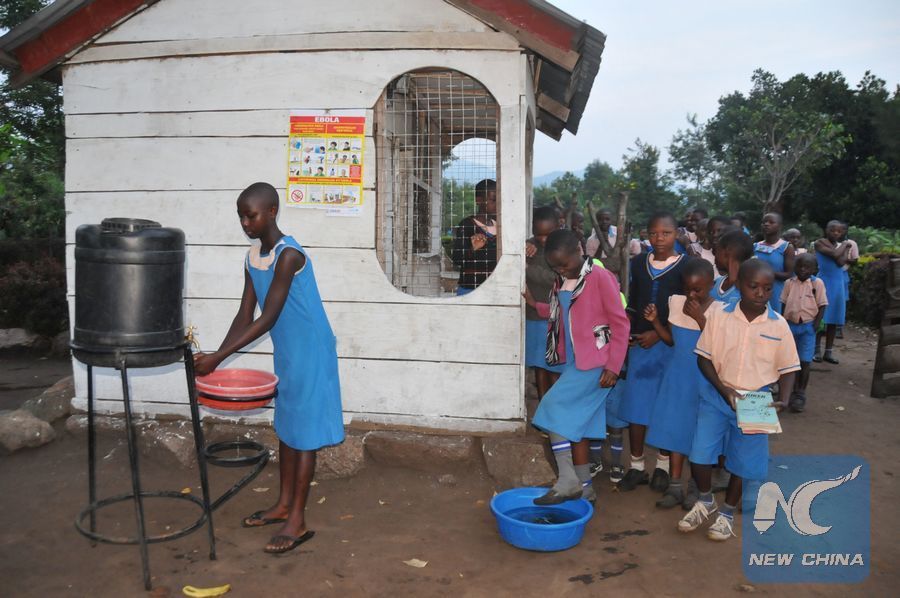
File photo shows pupils queue to wash their hands with chlorinated water to prevent the spread of Ebola at the St. John Kamasasa Primary School in Kasese district, Western Uganda, June 18, 2019. Uganda's Ministry of Health has so far registered three confirmed cases of Ebola a week after the deadly disease spread over the border from Democratic Republic of Congo. (Xinhua/Nicholas Kajoba)
ADDIS ABABA, July 21 (Xinhua) -- The African Union (AU) has said it will deploy more healthcare experts to respond to the Ebola virus outbreak in the Democratic Republic of Congo (DRC).
The virus has caused 1,621 deaths in the DRC as of July 17 in an outbreak that is the second largest in the history of Ebola since it was discovered in 1976.
"The AU will reactivate the African Voluntary Health Corps (AVoHC) and deploy them not just in the DRC but also in other countries within the region," an AU statement quoted John Nkengasong, Director of the AU's Africa Centre for Disease Control and Prevention (Africa CDC), as saying on Saturday.
According to the 55-member pan-African bloc, the decision to increase the number of volunteers is in response to the declaration by the World Health Organization (WHO), categorizing the outbreak as a Public Health Emergency of International Concern (PHEIC).
"This is a declaration that is issued when an event is extraordinary, serious and has a potential to cross beyond the country where it is and have a regional or international effect from the public health perspective. It is an important declaration because it changes the way the Africa CDC will support the Democratic Republic of Congo to respond to this outbreak," said Nkengasong.
Africa CDC, which has been supporting response efforts in the DRC since August 2018, presently operates with 41 experts who were deployed in the field, some of whom are said to be AVoHC members.
The AU, which had previously deployed the AVoHC in West Africa to respond to the outbreak back in 2014 to 2015, said that the AVoHC "will also be very useful in the current outbreak."
The AU, noting that insecurity and attacks on health centers and health providers as a major challenge to response efforts in the affected provinces, also revealed that it will "engage with the United Nations security system to improve security for deployed experts and facilities so that response efforts can continue without interruptions."
"We will be working with the Government of the DRC very closely to better coordinate our efforts with other partners like the WHO," Nkengasong said.
Other plans to strengthen response include the procurement and provision of additional equipment and supplies, strengthening cross-border surveillance and laboratory systems, and a new approach to risk communication and awareness-raising at the community level, it was noted.
The African Voluntary Health Corps is a team of 800 epidemiologists, anthropologists, as well as communication, laboratory and logistics experts, from different African countries who are on standby for emergency deployment.
According to the AU, majority of the AVoHC members have been "trained and are ready to be deployed anywhere within the continent."
The Africa CDC, as part of its interventions in the DRC Ebola epidemic, has deployed some 41 experts who are in the theatre of response, and trained over 800 local health care workers and community volunteers.
The Africa CDC response interventions also include support to the government of the DRC with 3,000 laboratory cartridges for use in detecting Ebola, establishing six laboratories fully supported and run by Africa CDC staff members, the training of some 469 healthcare workers, traditional healers and teachers in infection prevention and control, it was noted.

